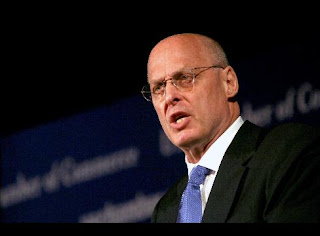 They say it isn't a bail out. They added a lot of decoration to it. But it is still the Paulson Plan just disguised a little better and renamed the 'Rescue' plan.
They say it isn't a bail out. They added a lot of decoration to it. But it is still the Paulson Plan just disguised a little better and renamed the 'Rescue' plan.Bail out really describes the plan better. Let me ask you, if you have loaned your money to someone who cannot or will not pay it back and you are depending on that money's return, wouldn't you feel bailed out if somebody comes along and buys that bad debt from you? You have just had your oxcart pulled out of the ditch, a lifeline thrown to you or in other words, bailed out of a sinking boat.
No matter how this is painted, named, or otherwise disguised, it is a bail out for bankers and fat cats who are getting a pass for loaning money to persons with no ability to repay the loan. Freddie Mac and Fannie Mae did underwrite a large percentage of these sub-prime loans. Both institutions were leveraged about 100:1. That high leverage of loan value to liquid available for coverage meant that they could not possibly cover the loans that they had underwritten without government intervention.
Before I get over my head with writing so far from what I am familiar, I refer you to this website that explains the sub-prime mess with authority. The actual inner workings and mechanics of what happened are not germane to this piece.
http://www.federalreserve.gov/newsevents/speech/mishkin20080229a.htm
In essence, the Secretary of the Treasury and the head of the Federal Reserve came up with the scheme to buy up the loans that can't be evaluated so capital can once again be trusted between the different financial institutions. For instance, say you are a financial institution that has just bought what looked like safe and sound mortgage loan securities. The financial institution who sold you those securities now has your money and you have a bunch of bad security. The old saying, "Once bitten twice shy", is also true among the moneylenders. It is not easy to explain to your stockholders how you lost their money. Any future loans are heavily scrutinized and only people with gold plated ratings will get loans now. Credit is squeezed; lost trust between institutions has altered the normal business as usual loan transfers.
Nobody consulted the Congress about possible alternatives to saving the credit situation. The Executive Branch handed a 3-page outline to Congress for approval that gave the Secretary of the Treasury authority over 700-billion dollars to dole out as he saw fit to buy up the bad loans that are choking the credit system.
Yes, we need action, but there are fair questions that also need answers.
- Since these loans do have value, there is property assigned to every one of them. Why is it not conceivable to auction off these mortgages to enterprising businesspersons? A lot of people would have jumped at the chance to buy some of these loans for 10 to 30 cents on the dollar.
- There was a lot of talk about keeping these people in the houses that they bought, so why not offer them to buy back their loans for what the Federal Government would have paid for them. It would have been nice to buy a $400,000 loan for $100,000, especially if the loan belongs to you. Financing would have been no problem for most of the borrowers.
There is a lot of talk about the profit potential for the Government with these bad loans by holding them until the market turns around. That same potential would exist for anybody given the chance to buy these securities.
Change of Subject: Tonight is the Vice-Presidential debate between Sarah Palin and Joe Biden. There is a lot on the line in this debate and I will give my take on it in Friday's edition.
We are proud as a peacock of our politicians. They give us such a warm, fuzzy, and secure feeling. They make sending them money such a pleasure because they can spend it so creatively. It just makes your heart go pitter-patter just to think of the swell job that they are doing. Even though they make a used car salesman look like Pious Pete, we keep re-electing them.
Cheers,
-Robert-
No comments:
Post a Comment
Please Include First Name and Town. -Thanks-